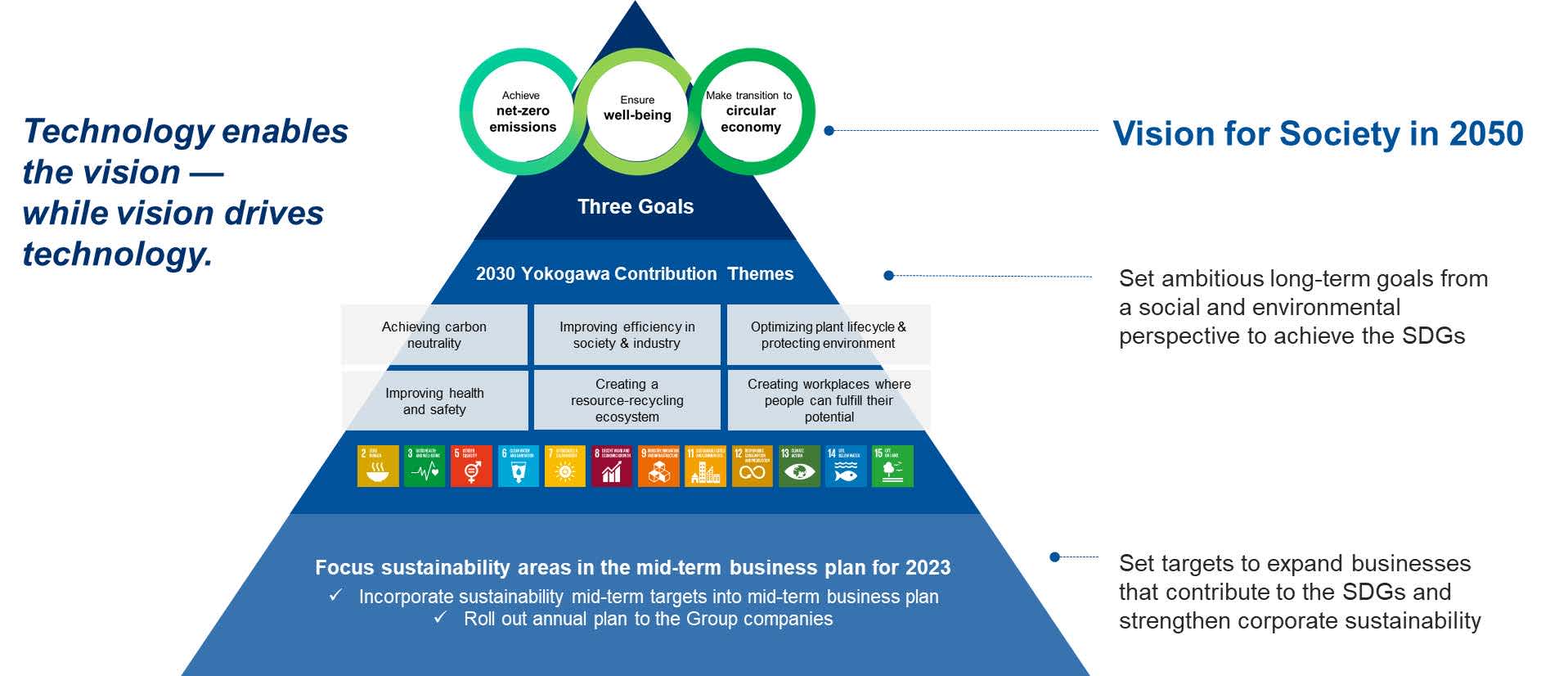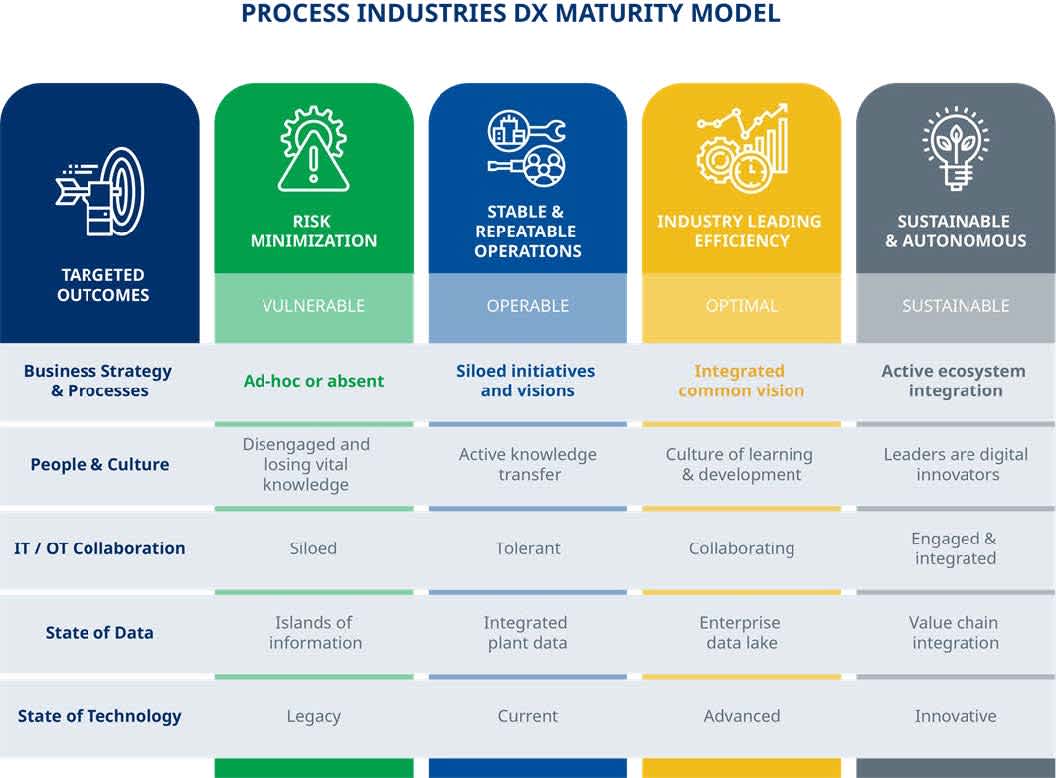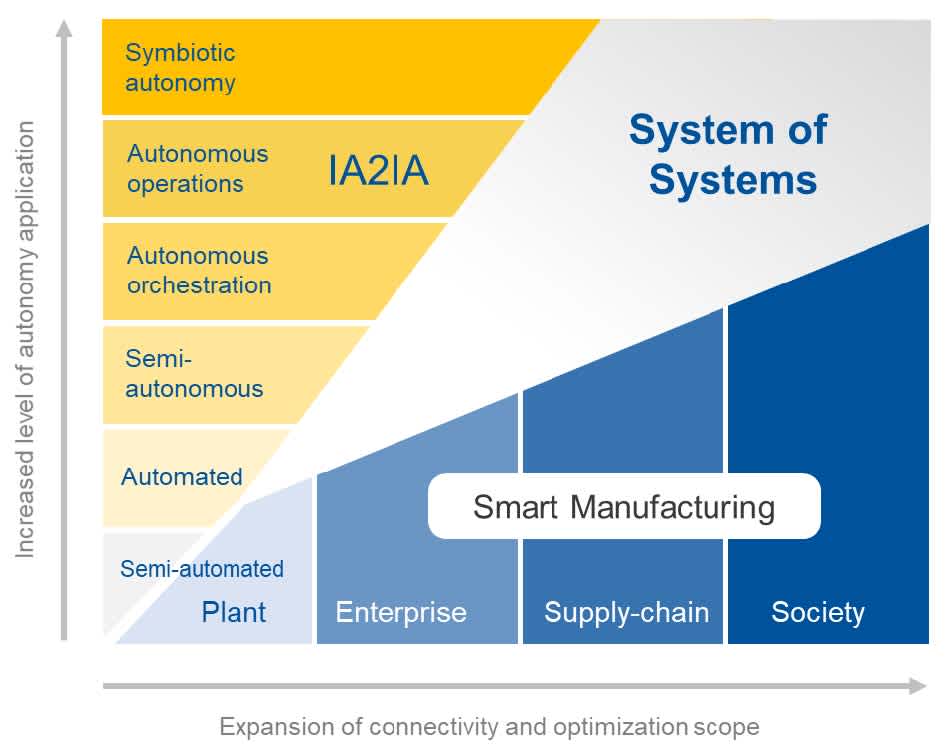Opening Keynote Outlines Yokogawa's Vision for Autonomous Operations and Smart Manufacturing
The opening keynote address on Yokogawa's vision for autonomous operations and Smart Manufacturing, by Dr. Yu Dai, Ph.D., Director and Senior Vice President, Digital Solutions HQ, set the stage for the entire event.
Ultimately, the company's vision extends well beyond those concepts, in fact, to the year 2050, when Yokogawa plans on achieving net-zero emissions, ensuring well-being, and transitioning to a circular economy, in line with United Nations Sustainable Development Goals (SDGs). Dr. Dai described sustainability areas in the mid-term business plan for 2023 and, by 2030, establishing ambitious, long-term goals from a social and environmental perspective to achieve the SDGs.
Yokogawa's vision is to bring about a symbiosis between industry and society in which these entities function autonomously, yet in a coordinated manner. By realizing this vision and continuing to create value, Yokogawa is taking the initiative in addressing social issues.

Yokogawa's vision and planning goals with milestones for the years, 2023, 2030, and 2050
Dr. Dai added that Yokogawa is delighted that many companies in the energy and chemical industries share similar visions for society and our planet. Many are already working on achieving SDGs. The management team expects that, in 2050, people will, in retrospect, greatly appreciate today's vision and the technological momentum that has been building.
Digital Transformation
Most businesses today are in the process of digital transformation. That was the focus of last year's virtual event, Y NOW 2020. Yokogawa defines digital transformation as the novel use of digital technology to accelerate a company's business strategies. It empowers people, optimizes processes, and automates systems within an organization to radically reorient its business performance. It is essential to consider leadership, new competencies, and change management to ensure a successful digital transformation.
As shown by the accompanying maturity model, there are many steps in the digital transformation journey. The key point is that it is comprehensive. Digital transformation affects all employees, business strategies, and business processes. For example, the people and the corporate culture progress through multiple stages, leading to digital innovation leadership.
Well-defined states for the business strategy and processes, IT/OT collaboration, data, and technology can also be identified – and, as milestones, achieved – as the digital transformation progresses.

A digital transformation maturity model for the process industries
Transforming to Autonomous Operations
The ultimate destination in the digital transformation journey is a sustainable, autonomous operation. Dr. Dai touched on the enabling technologies, which are critical to digital transformations leading to autonomous operations and Smart Manufacturing.
New technologies such as autonomous robots, artificial intelligence, augmented reality, and 5G allow for unprecedented levels of automation, including remote and unmanned operations. Putting humans out of harm's way, a facility might entirely automate its operations, maintenance, and incident management.
An autonomous future will require sensing and digital infrastructure that spans the entire operation and integrates data, smart devices at the edge, and robust hardware and software that deliver the necessary level of flexibility, adaptability, and resilience.
Furthermore, autonomous operations will enable process manufacturers to pivot from a "product push" to a "demand pull" business model. Beyond technology, this will almost certainly include the need for organizational change management, new competencies, and bold leadership.
Leading up to a description of Yokogawa's IA2IA, Industrial Automation to Industrial Autonomy initiative, Dr. Dai addressed Yokogawa's "system of systems" concept and the company's approach to Smart Manufacturing.
Smart Manufacturing and the System of Systems
The vision is to bring about a symbiosis between industry and society in which these entities function autonomously yet in a coordinated manner. By realizing this vision and continuing to create value, Yokogawa is taking the initiative to address critical issues to our society and our world. The vision extends to a concept to create value with autonomous operations, and Smart Manufacturing approaches. That is a "system of systems."
According to the system of systems concept, multiple, independently operating and managed systems coordinate together to achieve a purpose that extends well beyond the capabilities of any single system. Yokogawa visualizes a world in which entire societies function as systems of systems.
While the concept will incorporate technologies, which will have evolved well beyond those we know today, we can still visualize the path forward in terms of present-day technologies. For example, interoperability and open architecture form a foundation. The O-PAS standard, a subject of a fireside chat in this week's program, will provide a promising start.
In the system of systems, formerly disparate components will not only benefit from compatibility in terms of data, networking, and protocols, they will be autonomous. Using technologies such as artificial intelligence and digital twins, individual systems will be able to learn from each other without human intervention and rapidly adapt to market dynamics and disruptions. That allows them to advance continually and makes them inherently sustainable.
Smart Manufacturing is a related concept that employs digital transformation to progressively achieve autonomy in manufacturing sites, enterprises, and supply chains to dramatically improve productivity.
Smart manufacturing is defined by the International Organization for Standardization (ISO) and the International Electrotechnical Commission (IEC). The definition is "manufacturing that improves its performance aspects with integrated and intelligent use of processes and resources in cyber, physical, and human spheres to create and deliver products and services—and which also collaborates with other domains within enterprises' value chains."
The scope of Smart Manufacturing is broad and involves a journey. Connectivity beyond plants and enterprises at the IIoT and cloud levels provides seamless integration of data, including supply chain information, leading to Smart Manufacturing.

Industrial autonomy and Smart Manufacturing are related concepts that enable a system of systems.
To implement Smart Manufacturing, it is necessary to not only introduce new technologies as they become available but also prioritize the adoption of each solution based on a coherent vision of the future, along with analyses of the status quo and problems and their expected outcomes.
Industrial Automation to Industrial Autonomy—IA2IA
Yokogawa is promoting the evolution of industrial automation to industrial autonomy—IA2IA—by incorporating digital transformation enablers such as robotics and Blockchain technology.
Yokogawa defines industrial autonomy as the state in which plant assets and operations have learning and adaptive capabilities that enable responses with minimal human interaction, empowering operators to perform higher-level optimization tasks. Digital technologies sit at the core of realizing self-optimizing manufacturing processes and industrial autonomy.
The process industries will advance toward autonomous operations by focusing on areas of innovation such as predictive maintenance, smart energy consumption, routing flexibility, remote monitoring and control, human-robot collaboration, digital performance management, real-time supply-chain optimization, advanced process control, digital quality management, and data-driven demand prediction.
Industrial autonomy transcends industrial automation by adding layers of intelligent sensing and artificial intelligence to anticipate and adapt to both known and unforeseen circumstances. This removes the need for constant human intervention. In a fully autonomous operation, the autonomous system is responsible for all aspects of operation, from start-up to shut-down.
With IA2IA, high value will be added by proceeding in steps from semi-automation to full automation, then from semi-autonomous to full autonomy. With the autonomous operation of plant processes, human intervention can be minimized or eliminated, thus helping to prevent operator errors and reducing the need for people to work in harsh environments or hazardous areas.
Related Products & Solutions
-
Digital Transformation Consulting
DX Consulting provides advice and support with its global industry experience and vast technical expertise stemming from Yokogawa’s trusted digital technology and KBC’s years of improvement consulting.
-
Digital Twin
A digital twin is the key to effective decision making, providing deeper analytics technology and strategies to maximize profitability.
-
Digital Transformation
- Yokogawa's wide process manufacturing knowledge/expertise
- Digital transformation solutions for a better future for our customers